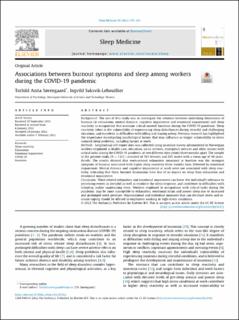Associations between burnout symptoms and sleep among workers during the COVID-19 pandemic
Peer reviewed, Journal article
Published version
Permanent lenke
https://hdl.handle.net/11250/3060033Utgivelsesdato
2022Metadata
Vis full innførselSamlinger
- Institutt for psykologi [3086]
- Publikasjoner fra CRIStin - NTNU [38062]
Sammendrag
Background
The aim of this study was to investigate the relations between underlying dimensions of burnout (ie exhaustion, mental distance, cognitive impairment and emotional impairment) and sleep reactivity in occupations that maintain critical societal functions during the COVID-19 pandemic. Sleep reactivity refers to the vulnerability of experiencing sleep disturbances during stressful and challenging situations, and manifests as difficulties with falling and staying asleep. Previous research has highlighted the importance investigating psychological factors that may influence or trigger vulnerability to stress induced sleep problems, including factors at work.
Methods
Longitudinal self-report data was collected using an online survey administered to Norwegian workers employed in health care, education, social services, emergency services and other sectors with critical tasks during the COVID-19 pandemic at two different time points three months apart. The sample in the present study (N = 1331) consisted of 76% females and 24% males with a mean age of 44 years.
Results
The results showed that work-related exhaustion measured at baseline was the strongest symptom of burnout associated with higher sleep reactivity three months later, followed by emotional impairment. Mental distance and cognitive impairment at work were not associated with sleep reactivity, indicating that these burnout dimensions have less of an impact on sleep than exhaustion and emotional impairment.
Conclusion
Work-related exhaustion and emotional impairment can lower the individual's tolerance to perceiving events as stressful as well as reinforce the stress response, and contribute to difficulties with initiating and/or maintaining sleep. Workers employed in occupations with critical tasks during the pandemic may be more susceptible to exhaustion, emotional strain and poorer sleep due to increased and prolonged work pressure. Organizational and individual measures that can decrease stress and increase coping should be offered to employees working in high-stress conditions.

